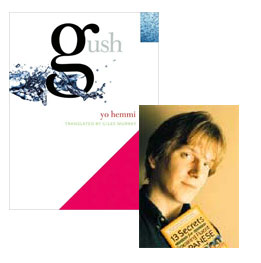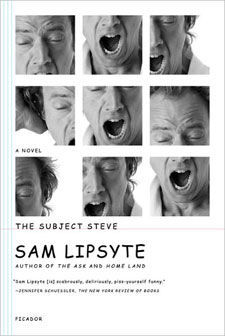Giles Murray on Gush: “Watery, But Certainly Not Grave”
 Gush is, as far as I know, the first time that English-language readers have been able to read the fiction of the Japanese poet and social activist Yo Hemmi—thanks to the translation work of Giles Murray. I had a look at the title novella earlier this week, and as Murray discusses in this essay explaining what drew him to the story, it’s a very unusual story, narrated by an insurance salesman who spots a woman shoplifting some imported cheese from a Tokyo supermarket. As she’s leaving, he notices a puddle of water on the floor; when they meet again soon after, she explains that the water builds up inside her until “I know I’m doing something bad, something I shouldn’t, [and] that’s when it comes out.” Of course, this “urge to spout water,” which she views as “a horrible, weird disease,” is basically female ejaculation… but, as our protagonist discovers when he embarks on an affair with her, for this woman it takes place on an epic scale. And, he soon realizes, the source of her deepest shame is also the source of his greatest pleasure. In the wrong hands, this could be crude and farcical, but Hemmi (and Murray) turn it into a melancholic story of the waning strength of impulsive love. (And there are still two other Hemmi stories for me to read after this! I’m looking forward to that.)
Gush is, as far as I know, the first time that English-language readers have been able to read the fiction of the Japanese poet and social activist Yo Hemmi—thanks to the translation work of Giles Murray. I had a look at the title novella earlier this week, and as Murray discusses in this essay explaining what drew him to the story, it’s a very unusual story, narrated by an insurance salesman who spots a woman shoplifting some imported cheese from a Tokyo supermarket. As she’s leaving, he notices a puddle of water on the floor; when they meet again soon after, she explains that the water builds up inside her until “I know I’m doing something bad, something I shouldn’t, [and] that’s when it comes out.” Of course, this “urge to spout water,” which she views as “a horrible, weird disease,” is basically female ejaculation… but, as our protagonist discovers when he embarks on an affair with her, for this woman it takes place on an epic scale. And, he soon realizes, the source of her deepest shame is also the source of his greatest pleasure. In the wrong hands, this could be crude and farcical, but Hemmi (and Murray) turn it into a melancholic story of the waning strength of impulsive love. (And there are still two other Hemmi stories for me to read after this! I’m looking forward to that.)
Alex Kerr, the author of two books on the arts, economy and society of Japan, believes that traditional Japanese culture was defined by the tension between man-made order and the disorder of nature. Stone gardens are one example he gives: Inside the garden, all is cold, sterile, gray and orderly; but immediately outside looms a mountainside heaving with great shaggy cedars, red-leafed maples and gaudy pink camellias. The artful austerity of the garden would be nothing without the wild fecundity of the natural world to set it off. Present-day Japan has erred too far on the side of sterility, artifice and order, argues Kerr, a loss of balance that has been detrimental both to the arts, and to society at large.
The existence of a handful of artists still able to channel Japan’s old earthy and instinctual side gives Kerr grounds for hope. One of these was Shohei Imamura, the movie director best known for The Eel, the 1997 Cannes Film Festival Palme d’Or winner. Prior to his death in 2006, the last full-length feature Imamura made was an adaptation of “Warm Water Under a Red Bridge,” a 1992 novella by Yo Hemmi. This novella has finally been translated into English (in a collection with two other short stories) under the title “Gush.”
11 February 2011 | in translation |
Read This: The Subject Steve
 I got a pleasant surprise in my mailbox this afternoon: a new paperback edition of The Subject Steve, the first novel by Sam Lipsyte. It’s a book that never quite found enough of its right audience upon its initial publication, in part because it was sent out into the world on September 11, 2001, and, despite some excellent reviews, America just didn’t seem to be “ready” for a dark satire about the life choices a man makes after he’s told that he’s dying of “something nobody had ever died of before… something absolutely, fantastically new.” There’s an almost kind of dream logic to the way events unfold, and some of those scenes still stick with me, a decade later.
I got a pleasant surprise in my mailbox this afternoon: a new paperback edition of The Subject Steve, the first novel by Sam Lipsyte. It’s a book that never quite found enough of its right audience upon its initial publication, in part because it was sent out into the world on September 11, 2001, and, despite some excellent reviews, America just didn’t seem to be “ready” for a dark satire about the life choices a man makes after he’s told that he’s dying of “something nobody had ever died of before… something absolutely, fantastically new.” There’s an almost kind of dream logic to the way events unfold, and some of those scenes still stick with me, a decade later.
I had the pleasure of interviewing Sam Lipsyte about The Subject Steve, when, among other things, he explained some of the novel’s logic: “I think that the tissue that holds the book together, that makes all the scenes feel as if they belong,” he told me, “is the language, the sentences. I took Steve very seriously as a narrator, as the speaker of this piece. I didn’t want him to be just a receiver of wounds.” You could say that’s something that has stayed true in Lipsyte’s fiction since then: The narrators of his subsequent novels, Home Land and The Ask, definitely have travails to suffer, but they aren’t just butt-ends for cosmic jokes. Lipsyte pitches their voices just right, making them appear that much more plausibly human to us even when their circumstances seem implausible or hover at the edge of the surreal. But this is where it all began, and if you missed The Subject Steve the first time around, I hope you’ll give it a read now.
9 February 2011 | read this |

 Our Endless and Proper Work is my new book with Belt Publishing about starting (and sticking to) a productive writing practice.
Our Endless and Proper Work is my new book with Belt Publishing about starting (and sticking to) a productive writing practice. 
